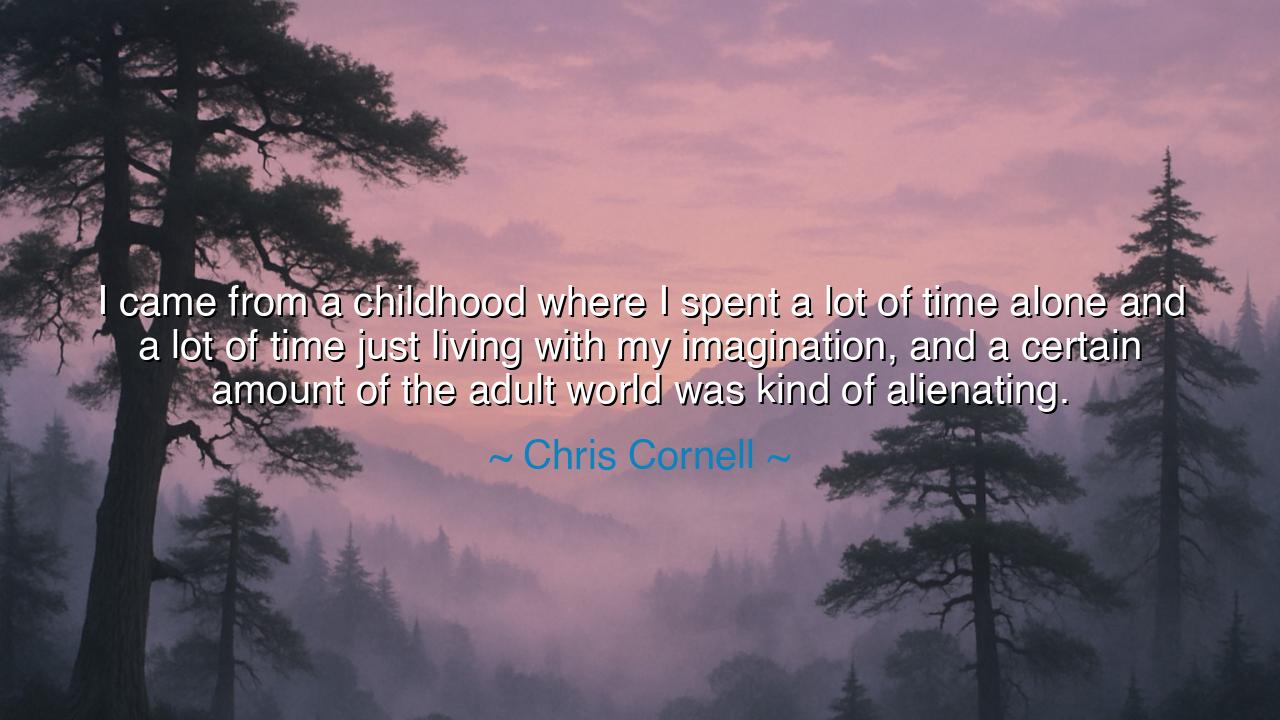
I came from a childhood where I spent a lot of time alone and a
I came from a childhood where I spent a lot of time alone and a lot of time just living with my imagination, and a certain amount of the adult world was kind of alienating.






The words of Chris Cornell — “I came from a childhood where I spent a lot of time alone and a lot of time just living with my imagination, and a certain amount of the adult world was kind of alienating.” — echo like a confession from the depths of solitude. They are not the words of despair, but of truth — the truth of a soul that was shaped in silence, by loneliness and by dreams. In them, Cornell speaks not only of himself, but of all who have walked the long corridors of childhood isolation, whose companions were not people but imagination, whose worlds were built not of brick and noise, but of thought and wonder. His words carry the quiet ache of the artist’s journey: born in solitude, misunderstood by the world, yet forever bound to transform that alienation into beauty.
Cornell, the voice behind Soundgarden and Audioslave, was a man who turned pain into poetry and solitude into sound. His quote reveals the soil from which his creativity grew — a childhood where loneliness became a forge, shaping sensitivity and imagination into art. Many see loneliness as a wound, but for him it was also a seed. In that stillness, his mind became his refuge, and his imagination, his universe. Like the poets and visionaries of old, he discovered that isolation, though painful, can be a doorway to depth. The world that shuns or forgets the lonely child unknowingly helps create the visionary — for in that aloneness, one learns to see beyond what others see.
The second half of his reflection — “a certain amount of the adult world was kind of alienating” — carries the melancholy of awakening. The child who grows rich in imagination often enters adulthood with a heart too alive for a world that measures worth by noise and conformity. The adult world, with its rules, demands, and pretenses, often rejects the dreamer. To one who has built worlds in silence, the machinery of ambition and routine feels foreign. Cornell, like many artists before him, found himself torn between two realities — the purity of inner creation and the coldness of outer existence. It is a tension as old as art itself, the battle between the inner truth of the soul and the external demands of society.
There are many in history who have walked this same path. Consider Vincent van Gogh, who too lived much of his life in solitude, misunderstood and often alone. His imagination was his constant companion; his colors, his means of communion with a world that could not understand him. To others, he seemed strange, unstable, alienated — yet through his isolation, he created visions that would one day speak to millions. Like Cornell, van Gogh turned loneliness into expression, and alienation into empathy. Both men remind us that the most powerful art often springs not from harmony with the world, but from distance from it.
Yet, Cornell’s words do not glorify isolation. They are tinged with sadness, a recognition that while imagination gives one wings, it can also make landing among others difficult. The alienation he speaks of is the ache of the soul that sees beauty too deeply, feels too much, and finds too little understanding in the eyes of others. This is the curse of sensitivity — to be aware of life’s wonder and pain at once, and to dwell between them. But it is also its gift. For the one who lives in imagination can later translate that unseen world into song, painting, poetry — into something that allows others to feel what they could not express.
The lesson in Cornell’s reflection is both tender and profound: never despise solitude, for it can be the teacher of the soul. Yet also, never forget to reach toward the world, even when it feels alien. The imagination is a sacred fire, but without connection, it can consume rather than illuminate. One must balance inner creation with outer communion, finding a bridge between one’s inner child and the adult world. The lonely heart that creates must also learn to share, to forgive the world its blindness, and to bring light to its darkness.
So, to those who grew up in silence, dreaming alone — take heart. Your imagination is not your weakness, but your strength. It is the seed of empathy, of insight, of art. But do not let the feeling of being alienated harden you. Instead, let it make you gentle, understanding, and brave. Use your gift to connect, to heal, to awaken others who have forgotten the magic of solitude. For in the end, as Cornell’s life reminds us, the true purpose of imagination is not to escape the world, but to re-enchant it — to take the loneliness of the soul and turn it into a song that others may find themselves within.






AAdministratorAdministrator
Welcome, honored guests. Please leave a comment, we will respond soon